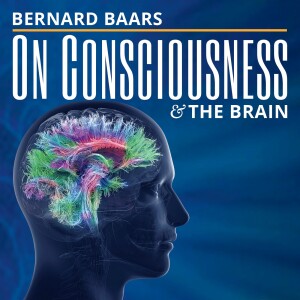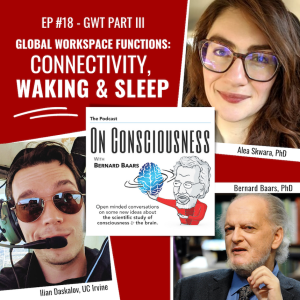
On Consciousness & the Brain with Bernard Baars
Science:Natural Sciences

#18 — Global Workspace Functions, the Brain and Consciousness: Connectivity, Waking, & Sleep - Part III
 2022-03-17
2022-03-17
Global Workspace Theory is probably oversimplified, just like the Newtonian theory of the planets and their orbits. And that's what framework theories usually do. You don't want to go to them for the details, you want to go to them for the overview. And Global Workspace is really an overview.
– Dr. Bernard Baars, originator of Global Workspace Theory and Global Workspace Dynamics, a theory of human cognitive architecture, the cortex and consciousness.
Ep 18: Global Workspace Functions, the Brain and Consciousness: Connectivity, Waking, & Sleep - Part 3
In Episode 18 of our podcast On Consciousness with Bernard Baars, the third in a three-part series on GWT Origins & Evidence, we continue to explore the links between cutting edge brain evidence and how that supports or updates our understanding of consciousness and the Global Workspace Theory.
Talking Points
- 0:00 – Intro and Recap of Episodes 17 & 18 (Parts I & II)
- 6:40 – A Discussion on Sleep, Dreaming, Waking, and Consciousness
- 10:35 – Summary of Marcello Massimini’s Research
- 18:35 – The Stages of Human Sleep
- 24:26 – What Are Neuronal Oscillations?
- 35:58 – Summary of Paper #1: The Sleep Slow Oscillation as a Traveling Wave (Massimini et al., 2004)
- 50:34 – How GWT is Related to the Findings of Paper #1: Massimini et al. (2004)
- 57:10 – Summary of Paper #2: Breakdown of Cortical Effective Connectivity During Sleep (Massimini et al., 2005)
- 1:03:43 – Discussion of Findings in Paper #2: Massimini et al. (2005)
- 1:20:34 – What Does Effective Connectivity Tell Us About Consciousness?
- 1:30:03 – Does the Evidence Support a Grand Hypothesis?
Summary
What can sleep tell us about the conscious mind?After some quick introductions and a summary of the previous two episodes by Ilian, the trio delves right into the main subject of the conversation, namely what can sleep tell us about the conscious mind. Bernie explains that in everyday life, sleep is the most natural absence of consciousness and that it can serve as a comparison to moments of awareness.
Next, Alea introduces the work of Marcello Massimini M.D., Ph.D., a professor in the Department of Biomedical and Clinical Sciences at the University of Milan, Italy, whose papers are the central topic of discussion in this episode. She points out that Massimini’s research is devoted to understanding changes in thalamocortical networks when consciousness fades and recovers, such as when we sleep and reawaken. The organ of consciousness inside the brain is a system that includes the cortex, and an egg-shaped structure inside the cortex, called thalamus. They work closely together and we call it the corticothalamic (CT) system. Alea emphasizes that in addition to neurophysiology, Massimini is interested in the theoretical and philosophical implications of the neuroscience of consciousness.
Bernie, Alea, and Ilian describe the stages and the mechanisms of the sleep cycle, namely the REM and non-REM phases. The trio also define some of the terminology used in this conversation, focusing on neuronal oscillation, or the electrical patterns of activity in the central nervous system. When examined with an EEG, oscillations throughout the brain display which regions are active during a particular state.
The Sleep Slow Oscillation as a Traveling Wave
The Sleep Slow Oscillation as a Traveling Wave, Massimini et al. (2004) is the first of two papers analyzed. Alea thoroughly summarizes the contents of the paper, indicating that the researchers detected traveling waves in the sleeping brain, particularly during nREM sleep. These waves had a site of origin and a direction, and most frequently originated in anterior (frontal) regions, and propagated posteriorly (back), although they can originate anywhere and propagate in any direction.
Bernie makes the point that a fundamental framework for Global Workspace Theory is precisely this broadcast and build concept. GWT implies that there is information being transmitted and these traveling waves are obviously one possible way that can reflect the transmission of information.
When We Fall Asleep, Consciousness Fades, Yet The Brain Remains Active.
The second paper, titled Breakdown of Cortical Effective Connectivity During Sleep, Massimini et al. (2005), makes the observation that when we fall asleep, consciousness fades, yet the brain remains active. The researchers set out to understand why that is. They hypothesize that it is due to changes in information transfer. This ability to transfer and integrate information across multiple systems requires something called “effective connectivity” - or the ability of firing in one group of neurons to affect the firing of another. Massimini and his team suggest that consciousness is dependent on the brain’s ability to integrate information. This paper does seem to offer evidence for the breakdown of long-range connectivity during sleep. This is consistent with the broadcasting hypothesis which was discussed in parts I and II of this GWT series.
Bernie highlights the fact that even though the results appear to support the idea that this ability to transfer and integrate information across distant brain regions is necessary for conscious experience, the paper does have its limitations, such as the timing and measurement of the TMS (transcranial magnetic stimulation) pulse.
In the final moments of the episode, the trio ponder what these findings might tell us about consciousness. Bernie believes that for him, the conclusions from these papers do not support the grand hypothesis of how consciousness is formed. Alea agrees, and says that although complex questions cannot be answered by a single paper, such studies serve as fundamental stepping stones to gain a better understanding of the grander picture.
We are always at the edge of ignorance.
Some people suggest that dreaming is a kind of conscious state. Very early sources claim that waking is consciousness of the world, dreaming is consciousness of an inner world, and unconscious sleep is lack of any kind of conscious content. There are several things that we think we know, and there are a lot of things we don’t know. So we make our best guesses and when we find new evidence we change our guesses.
“I actually have a take-home lesson. This is to scientists and it's private. So don't tell anybody else. Try asking your subjects what they are experiencing and maybe you'll learn something.”
-Bernard Baars, PhD
Cited Papers
Massimini, M., Ferrarelli, F., Huber, R., Esser, S. K., Singh, H., & Tononi, G. (2005, September 30). Breakdown of cortical effective connectivity during sleep. Science. https://www.science.org/doi/10.1126/science.1117256
Massimini, M., Huber, R., Ferrarelli, F., Hill, S., & Tononi, G. (2004, August 4). The sleep slow oscillation as a traveling wave. Journal of Neuroscience. https://www.jneurosci.org/content/24/31/6862
Get a 40% Discount for your copy of Bernie Baars' acclaimed new book On Consciousness: Science & Subjectivity - Updated Works on Global Workspace Theory
- GO TO: http://shop.thenautiluspress.com
- APPLY DISCOUNT CODE AT CHECKOUT: "PODCASTVIP"
Bios
Alea Skwara is a PhD candidate at the University of California, Davis where she studies cognitive neuroscience. Her primary research focuses on compassion and responses to suffering. The main question that Alea is currently trying to answer is whether meditational practices can expand the range of people that a person can feel compassion for.
Ilian Daskalov is a senior undergraduate student at University of California, Irvine where he studies Cognitive Science. He holds an associate degree with honors from San Diego Mesa College. His research interests include sleep, psychedelics, and artificial intelligence. He is passionate about communicating science and promoting critical thinking.
More Episodes
Create your
podcast in
minutes
- Full-featured podcast site
- Unlimited storage and bandwidth
- Comprehensive podcast stats
- Distribute to Apple Podcasts, Spotify, and more
- Make money with your podcast
It is Free
- Privacy Policy
- Cookie Policy
- Terms of Use
- Consent Preferences
- Copyright © 2015-2024 Podbean.com





